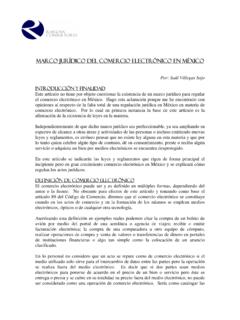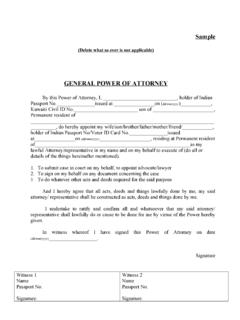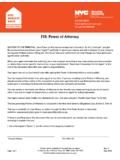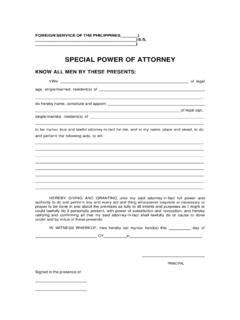Transcription of MEXICAN POWERS OF ATTORNEY - Raigosa …
1 MEXICAN POWERS OF ATTORNEY By: Sa l Villegas Sojo The granting and execution of mandates or POWERS of ATTORNEY constitute one of the most commonly used legal figures in day-to-day matters and in the commercial activities of persons (the term persons as used herein includes both individuals and entities). In Mexico, the Federal Civil Code ( FCC ) and the Civil Codes pertaining to the different States govern the generalities, types, obligations, granting, forms of execution and termination of mandates or POWERS of ATTORNEY . POWERS of ATTORNEY gain importance because thanks to them a number of commercial acts are formalized every day.
2 Due to their common and ordinary nature, we seldomly stop to analyze the ways in which POWERS are granted or the fact that they are crucial for the commercial activities of entities. The purpose of this brief essay is to analyze the process of granting POWERS of ATTORNEY , which POWERS are more adequate depending on the activity to be performed, why should they sometimes be limited, which capacities and limitations do attorneys-in-fact have with their different mandates and how can a conferred mandate be terminated. GRANTING OF POWERS OF ATTORNEY The FCC clearly sets forth that the mandate is an agreement.
3 It is deemed as such because it evidences the agreement reached by the parties for one of them to execute on behalf of the other, the requested legal acts; such agreement being formalized by the acceptance thereof by the recipient. The acceptance may be express, when the ATTORNEY evidences the acceptance of its appointment in writing or before a notary public, or in an implied manner in which case the commencement of the requested legal acts is understood to be an acceptance of the mandate. The ultimate purpose of POWERS of ATTORNEY is the performance on behalf of a person of certain licit legal acts in which the law does not require the personal intervention of the interested party.
4 In the case of individuals, it may be granted to represent someone who is unable to appear in a certain act or when such appearance could be against such party s interests, or when such person prefers that certain legal acts be performed by experts in a specific field or simply for being more convenient. The case of entities is different, since although by law they are given independent legal character and capacity, they will always be represented by individuals to whom POWERS of ATTORNEY have been granted. It is our opinion that although the FCC allows for POWERS of ATTORNEY to be granted either verbally or in writing, only written POWERS of ATTORNEY are deem valid, since POWERS of ATTORNEY granted verbaly must first be ratified in writing before the matter or business for which the power was granted is concluded.
5 Below is a brief example to show how such granting method is no longer applicable: if an individual publically requests, authorizes and empowers a third party to sell a real estate property on his behalf before three witnesses, the ATTORNEY may start the performance of the requested acts; however, the grantor conserves the option (and hence the authority to cancel) of ratifying or not the mandate granted, and he must do so before the transaction is concluded. This is in addition to the fact that any potential buyer will most likely request to review the written power of ATTORNEY of the seller s representative.
6 It is important to point out that as opposed to many other countries, Mexico does not adopt the apparent authority theory. With respect to entities and corporations, its officers, directors and 2even its shareholders are not deemed to have POWERS for the sole fact of being officers, directors or shareholders; such POWERS must necessarily be expressly granted in writing. Article 2551 of the FCC sets forth the ways in which POWERS of ATTORNEY may be formalized in writing: I. In public deed; II. In a private document, executed by the grantor before two witnesses and ratified their signatures before Notary Public, Lower Court Judge, Justice of the Peace, or before the corresponding administrative officer or employee, when the mandate is granted for administrative matters; III.
7 In a proxy letter with no ratification of signatures. We would like to point out that many times it is believed that for POWERS of ATTORNEY to be properly granted, they necessarily must be conferred in a public deed; the truth is that there are other equally valid granting methods. The reason for requesting a notarized power of ATTORNEY may be a result of tradition, or in some other cases, of the requests and methods of certain authorities. Given the high costs involved in formalizing POWERS of ATTORNEY in a public deed, we recommend that alternate methods of formalization be studied and considered.
8 A less expensive solution is only to ratify the signatures before a Notary Public. However, the FCC sets forth the circumstances under which POWERS of ATTORNEY must be granted with specific formalities. POWERS of ATTORNEY must be granted in a public deed or through a proxy letter executed before two witnesses, and ratifying the signatures of the grantor and the witnesses before a notary public in the following cases: A) When the power of ATTORNEY is general; B) When the value of the business exceeds the equivalent to one thousand times the general minimum wage ( GMW ) in the Federal District ( FD ) at the time of granting.
9 In September 2006 the GMW in the FD was of $ pesos per day; consequently, the value of the business would need to exceed $48, pesos (approximately US$4, ); and C) When the ATTORNEY must execute an act that pursuant to applicable law must be evidenced in a public instrument. Pursuant to paragraph B) above, the power of ATTORNEY may be granted in a private document executed before two witnesses without requiring the ratification of signatures, if the value of the business does not exceed one thousand times the GMW in effect in the FD at the time of granting. The granting may be done verbally when the value of the business does not exceed fifty times the GMW of the FD, currently being the amount of $2, pesos (or approximately US$ ), which does not exempt the obligation of ratifying the power of ATTORNEY before the business is concluded and supports our interpretation that verbal grantings are no longer applicable based on the low thresshold amount.
10 The law is clear in setting forth that a Notary Public must participate in the granting of POWERS of ATTORNEY either executing public deeds or ratifying signatures. It would be wrong to determine that special POWERS of ATTORNEY do not require the involvement of a notary simply because of their nature; we must determine the value of the business to make such decision. 3 Finally, it is important to set forth that not only must the grantor be concerned with properly granting a mandate; the recipient must also verify the proper formalization. Not meeting with the aforementioned requirements annuls the power of ATTORNEY , leaving in effect the obligations reached between the good-faith third party and the ATTORNEY -in-fact, as if the ATTORNEY -in-fact would have acted on its own behalf.










